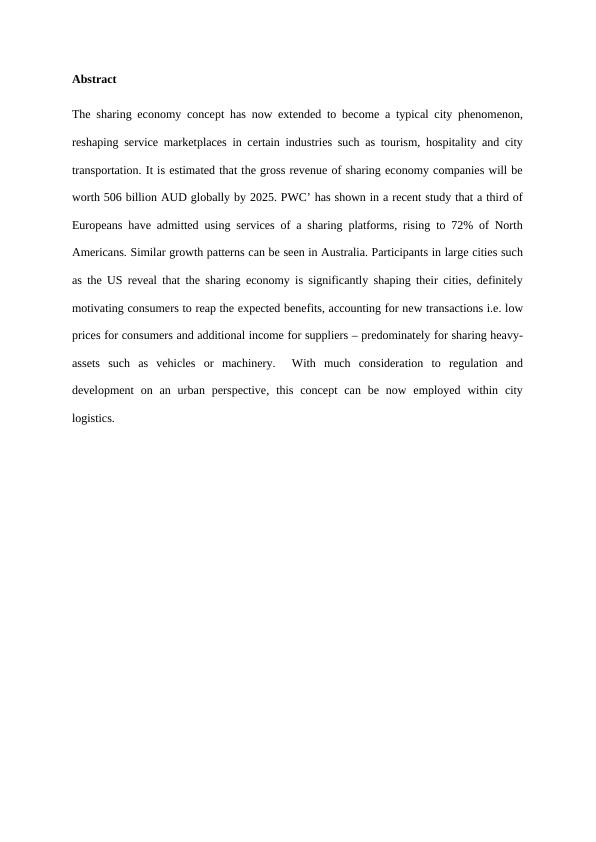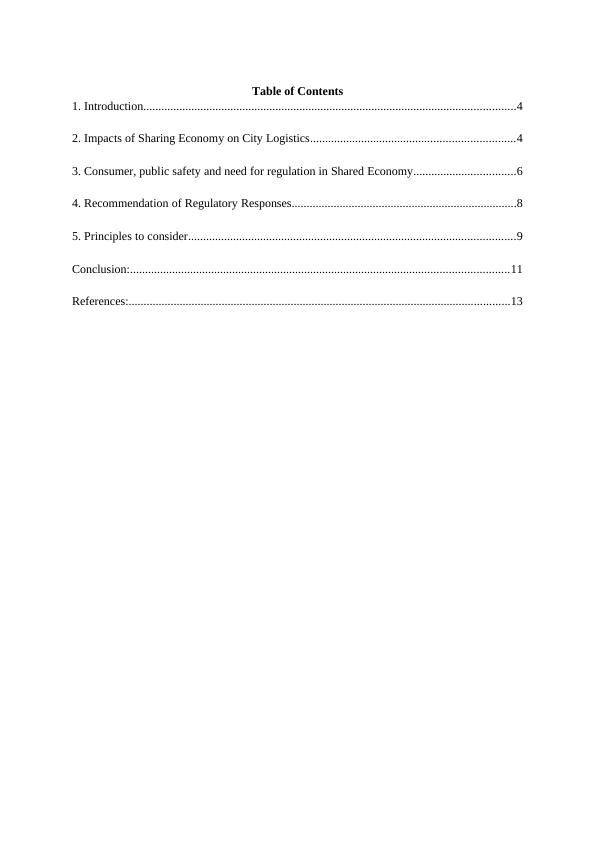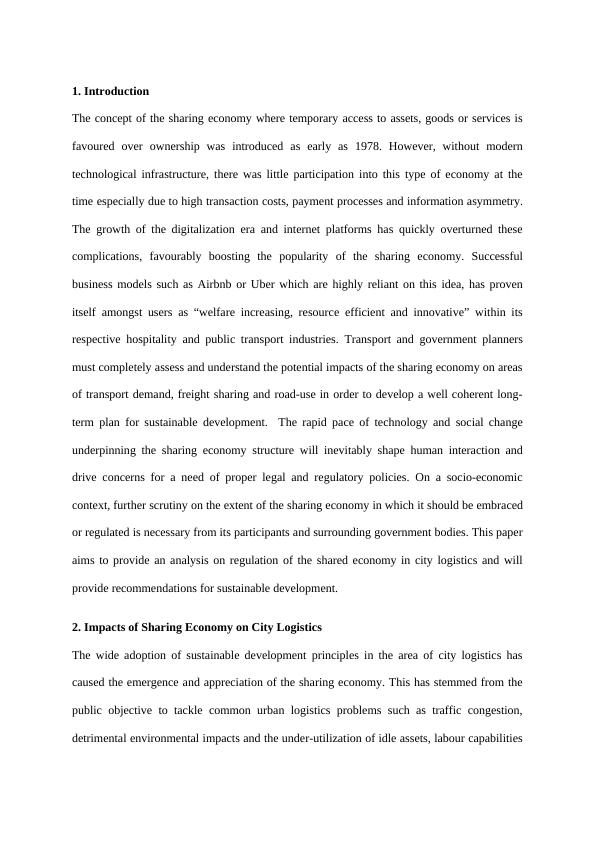Recommendations on regulatory policies for a sustainable shared economy within city logistics
Added on 2022-08-15
14 Pages3335 Words14 Views
“Recommendations on regulatory policies for a sustainable shared economy within city
logistics”.
logistics”.

Abstract
The sharing economy concept has now extended to become a typical city phenomenon,
reshaping service marketplaces in certain industries such as tourism, hospitality and city
transportation. It is estimated that the gross revenue of sharing economy companies will be
worth 506 billion AUD globally by 2025. PWC’ has shown in a recent study that a third of
Europeans have admitted using services of a sharing platforms, rising to 72% of North
Americans. Similar growth patterns can be seen in Australia. Participants in large cities such
as the US reveal that the sharing economy is significantly shaping their cities, definitely
motivating consumers to reap the expected benefits, accounting for new transactions i.e. low
prices for consumers and additional income for suppliers – predominately for sharing heavy-
assets such as vehicles or machinery. With much consideration to regulation and
development on an urban perspective, this concept can be now employed within city
logistics.
The sharing economy concept has now extended to become a typical city phenomenon,
reshaping service marketplaces in certain industries such as tourism, hospitality and city
transportation. It is estimated that the gross revenue of sharing economy companies will be
worth 506 billion AUD globally by 2025. PWC’ has shown in a recent study that a third of
Europeans have admitted using services of a sharing platforms, rising to 72% of North
Americans. Similar growth patterns can be seen in Australia. Participants in large cities such
as the US reveal that the sharing economy is significantly shaping their cities, definitely
motivating consumers to reap the expected benefits, accounting for new transactions i.e. low
prices for consumers and additional income for suppliers – predominately for sharing heavy-
assets such as vehicles or machinery. With much consideration to regulation and
development on an urban perspective, this concept can be now employed within city
logistics.

Table of Contents
1. Introduction............................................................................................................................4
2. Impacts of Sharing Economy on City Logistics....................................................................4
3. Consumer, public safety and need for regulation in Shared Economy..................................6
4. Recommendation of Regulatory Responses...........................................................................8
5. Principles to consider.............................................................................................................9
Conclusion:..............................................................................................................................11
References:...............................................................................................................................13
1. Introduction............................................................................................................................4
2. Impacts of Sharing Economy on City Logistics....................................................................4
3. Consumer, public safety and need for regulation in Shared Economy..................................6
4. Recommendation of Regulatory Responses...........................................................................8
5. Principles to consider.............................................................................................................9
Conclusion:..............................................................................................................................11
References:...............................................................................................................................13

1. Introduction
The concept of the sharing economy where temporary access to assets, goods or services is
favoured over ownership was introduced as early as 1978. However, without modern
technological infrastructure, there was little participation into this type of economy at the
time especially due to high transaction costs, payment processes and information asymmetry.
The growth of the digitalization era and internet platforms has quickly overturned these
complications, favourably boosting the popularity of the sharing economy. Successful
business models such as Airbnb or Uber which are highly reliant on this idea, has proven
itself amongst users as “welfare increasing, resource efficient and innovative” within its
respective hospitality and public transport industries. Transport and government planners
must completely assess and understand the potential impacts of the sharing economy on areas
of transport demand, freight sharing and road-use in order to develop a well coherent long-
term plan for sustainable development. The rapid pace of technology and social change
underpinning the sharing economy structure will inevitably shape human interaction and
drive concerns for a need of proper legal and regulatory policies. On a socio-economic
context, further scrutiny on the extent of the sharing economy in which it should be embraced
or regulated is necessary from its participants and surrounding government bodies. This paper
aims to provide an analysis on regulation of the shared economy in city logistics and will
provide recommendations for sustainable development.
2. Impacts of Sharing Economy on City Logistics
The wide adoption of sustainable development principles in the area of city logistics has
caused the emergence and appreciation of the sharing economy. This has stemmed from the
public objective to tackle common urban logistics problems such as traffic congestion,
detrimental environmental impacts and the under-utilization of idle assets, labour capabilities
The concept of the sharing economy where temporary access to assets, goods or services is
favoured over ownership was introduced as early as 1978. However, without modern
technological infrastructure, there was little participation into this type of economy at the
time especially due to high transaction costs, payment processes and information asymmetry.
The growth of the digitalization era and internet platforms has quickly overturned these
complications, favourably boosting the popularity of the sharing economy. Successful
business models such as Airbnb or Uber which are highly reliant on this idea, has proven
itself amongst users as “welfare increasing, resource efficient and innovative” within its
respective hospitality and public transport industries. Transport and government planners
must completely assess and understand the potential impacts of the sharing economy on areas
of transport demand, freight sharing and road-use in order to develop a well coherent long-
term plan for sustainable development. The rapid pace of technology and social change
underpinning the sharing economy structure will inevitably shape human interaction and
drive concerns for a need of proper legal and regulatory policies. On a socio-economic
context, further scrutiny on the extent of the sharing economy in which it should be embraced
or regulated is necessary from its participants and surrounding government bodies. This paper
aims to provide an analysis on regulation of the shared economy in city logistics and will
provide recommendations for sustainable development.
2. Impacts of Sharing Economy on City Logistics
The wide adoption of sustainable development principles in the area of city logistics has
caused the emergence and appreciation of the sharing economy. This has stemmed from the
public objective to tackle common urban logistics problems such as traffic congestion,
detrimental environmental impacts and the under-utilization of idle assets, labour capabilities

End of preview
Want to access all the pages? Upload your documents or become a member.
Related Documents
Study on Urban Sustainable Regionslg...
|11
|3637
|67
Impact of Car Free City on Economy, Health, Hospitality, Event and Tourism Industrieslg...
|9
|2547
|291
Report on Derby and Derbyshire Waste Treatment Centrelg...
|8
|1691
|66
Market for Peer-to-Peer Accommodation in Australialg...
|12
|1509
|73
Annotated Bibliography on Asset Management Strategy in the Roads and Highways Industrylg...
|10
|2299
|23
Sustainable Development Introductionlg...
|10
|3488
|30
